Editor's note: This story contains graphic descriptions of sexual and physical violence.
Narcisa Claveria will turn 89 this year, two days before Christmas. Stepping onto the veranda of the family apartment, she takes a moment to check on her 92-year-old husband, who eyes visitors with a weary look. The couple lives in the hill town of Antipolo, an hour outside Manila, in the Philippines. Outwardly, she is grandmotherly, sweet and tranquil.
But when memories from 75 years ago are tapped, her mood changes.
Narcisa begins to cry as she thinks back to her childhood in the Philippines during World War II. "If I could prevent the sun from setting, I would, because whenever night fell, they would start raping us," she says. She was 12 years old at the time.
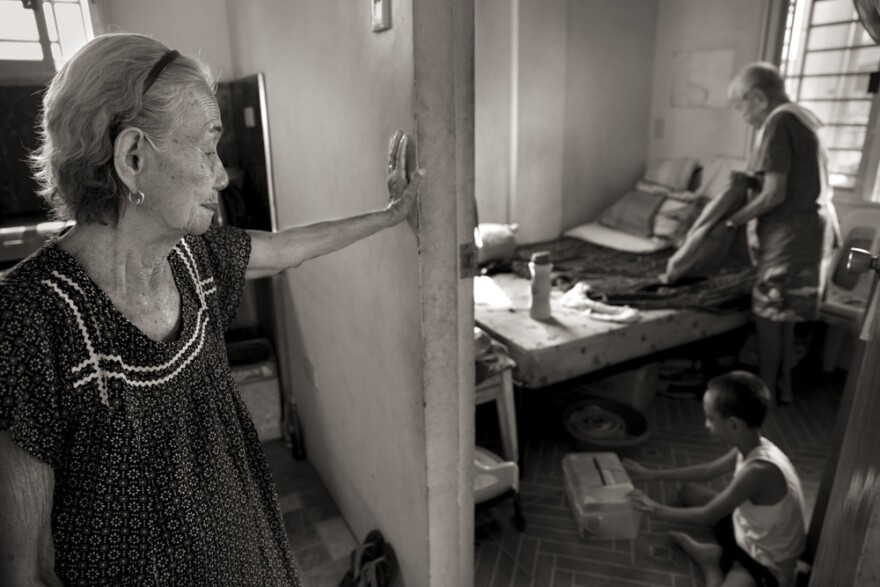
Narcisa is one of the last survivors of a system of sexual servitude set up by the Japanese imperial troops during World War II. They used abduction, coercion and deception to force women and girls to provide sexual gratification to military personnel. Researchers cited in court cases say that large numbers of them did not survive.
It was a far-ranging system of sexual enslavement. Historians estimate that some 200,000 women were victimized by Japanese soldiers in parts of Asia occupied by Japan, prominently Korea. But also Singapore, Myanmar, Vietnam, Thailand, Indonesia and Taiwan.
And in the Philippines as well. There were "probably about a thousand women and girls taken and put into military sex-slave camps" during the Japanese occupation from 1942 to 1945, according to writer and researcher Evelina Galang.

Over a period of 18 months, NPR identified and conducted interviews with at least two dozen survivors across the Philippines. In several instances, close family members shared stories told to them by the women who were too infirm to talk. Their portraits are not only the tale of their grievous bodily violations but a tableau of life in war.
A Twisted Title
The Japanese called them "comfort women" — a term derived from the Japanese word ianfu, combining the Chinese characters meaning "comfort or solace" (i-an) with woman (fu). The enslavement camps where they were forced to have sexual intercourse with Japanese soldiers were called "comfort stations" and were often the same garrisons where they were being held.
"Comfort women" is a linguistically warped categorization of the thousands of women and girls, many from poor communities, who were forced to serve as sex slaves. Manila-based attorney Romel Bagares, who has represented some of the women for 16 years, told NPR that the term "hides the untold abuse the victims suffered under the Japanese Imperial Army and denies the victims the dignity they deserve." He says some advocates urge that the term be changed to "survivors of the wartime female slavery system."

Yet the women commonly use the term. Bagares says in some cases it's a bid to "own it" and have it "signify protest."
Japan rationalized the sex slave practice as a way to curb the rape of local women by Japanese troops following the event known as the Rape of Nanking in 1937, when their soldiers sexually assaulted tens of thousands of women in the city that was then the capital of China.
For decades, the survivors of the "comfort women" system did not share their stories. Their private pain, hidden in shame, was concealed from the outside world. But by the early 1990s, details of their experiences began to emerge in a series of lawsuits against Japan. They wanted Japan to offer a public apology and financial compensation for their suffering.

The women of South Korea were the first to organize "comfort women" into a national movement, adding the term to the jurisprudence of human rights for women in wartime.
Carol Gluck, a history professor at Columbia University who focuses on modern-day Japan, says, "Without the testimonies of the comfort women, we would not know what happened."
But the larger-scale story of sexual enslavement inflicted on Korea, which was under Japanese colonial rule for 35 years, has eclipsed the experience of other so-called "comfort women." Like the few remaining women in Korea, survivors in the Philippines — now in their 80s and 90s — are still demanding to be heard.
In the Philippines, their confinement ranged from a matter of nights to more than a year. When the war was over, these women were left with physical and psychological scars: post-traumatic stress disorder, sexually transmitted diseases and damaged reproductive systems. Many were treated as outcasts, at times shunned by their own families.
Organized in various and sometimes competing groups, the so-called "comfort women" of the Philippines have demanded official recognition and compensation from Japan as well as acknowledgment by the Philippine government of their continuing plight.
Of the approximately 400 women who were identified as "comfort women" in the Philippines, only 45 to 50 are believed to be alive today. Many are reluctant to speak about their experience owing to privacy, trauma and old age.
Here are some of their stories recorded by the NPR team — correspondent Julie McCarthy, photojournalist Cheryl Diaz Meyer and producer Ella Mage — and some of the controversies that persist to this day as the women demand justice.
Tears And Testimony From 3 Survivors
Japanese occupiers arrived at her family's doorstep in Abra, a rugged corner in the northwest main island of Luzon, in 1943. Narcisa Claveria said troops moved house to house looking for Philippine guerrillas and accusing her father, the village leader, of colluding with them. They lashed him to a pillar of the house. Her father said he "knew nothing," as he pleaded for mercy.
Before her eyes, Narcisa said, a Japanese solider took "his bayonet" and began to skin her father "like a water buffalo."
Hearing her mother's cries, she raced upstairs. "I saw my mother lying down, with her skirt up, and there was a Japanese soldier on top of her. Then I ran." Narcisa says her two youngest siblings began hitting the soldiers with small sticks. "The soldiers then snatched away the sticks and bayoneted them," killing them both. They were "maybe 4 and 5 years old," she says.

Narcisa believes her parents were killed when Japanese troops torched the village that day. Soldiers dragged her and two older sisters off to a garrison. The oldest she never saw again. Narcisa was among eight girls and women who by day cooked, cleaned and did laundry. By night, she says, the troops raped them. "I was in a different room every night," Narcisa says. She says if they protested, "they flayed us with horse's whip." The building, she says, heaved "with crying."
Narcisa was 12 and says she endured approximately 18 months as a captive in the garrison. In her one family, four sisters, their mother and an aunt were subjected to systematized sexual violence in the war.
Narcisa attributes her survival after such an experience to the man who became her husband, Anaceto Claveria. "I was so scared of men," Narcisa says, but she explains that her husband's kindness and patience helped her overcome the terror.
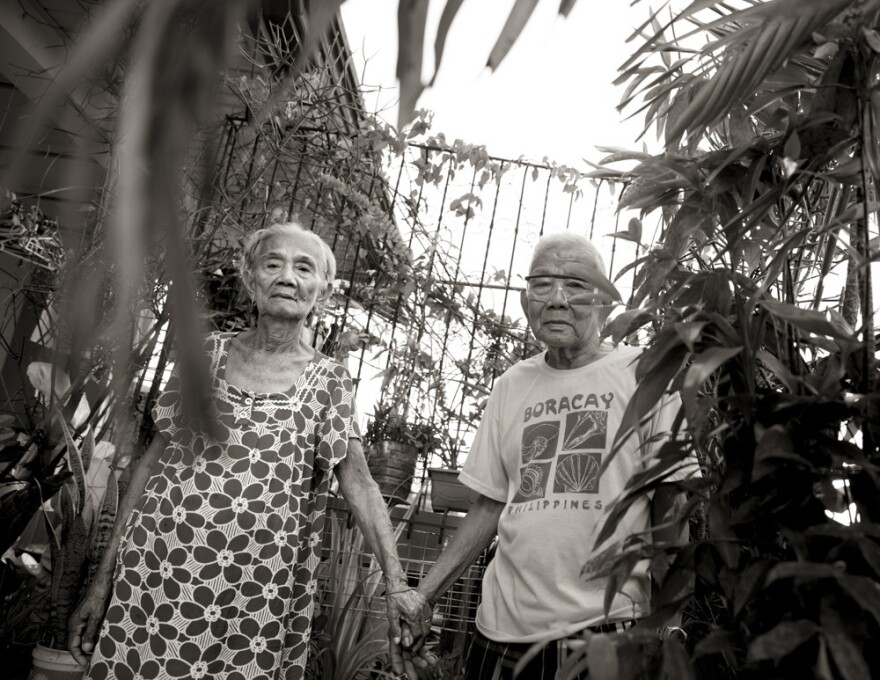

"He would always say to me, 'Fix your mind. I don't think less of you. You are lucky because you came back alive. Everything the Japanese did to you, throw out of your mind.' " Narcisa says her husband helped her mentally heal and encouraged her to tell her story. "And this made me stronger."
These days, Narcisa masks up and goes to the market once a week, and checks in on her son. The Philippines has one of the highest rates of coronavirus infection in Southeast Asia, but that doesn't deter her. "I'd rather die in the streets," Narcisa says, "than stay dying of sadness at home."
Teresita Bermudez Dayo:
We pass over the threshold of the door that leads us through the overgrown remains of Belo Mansion, and Teresita Bermudez Dayo, 90, hesitates. "I'm afraid here. This is not a good place," she says. In 1943, Teresita was imprisoned within its dark walls and used as a "comfort woman" by the occupying Japanese soldiers in the Philippines.
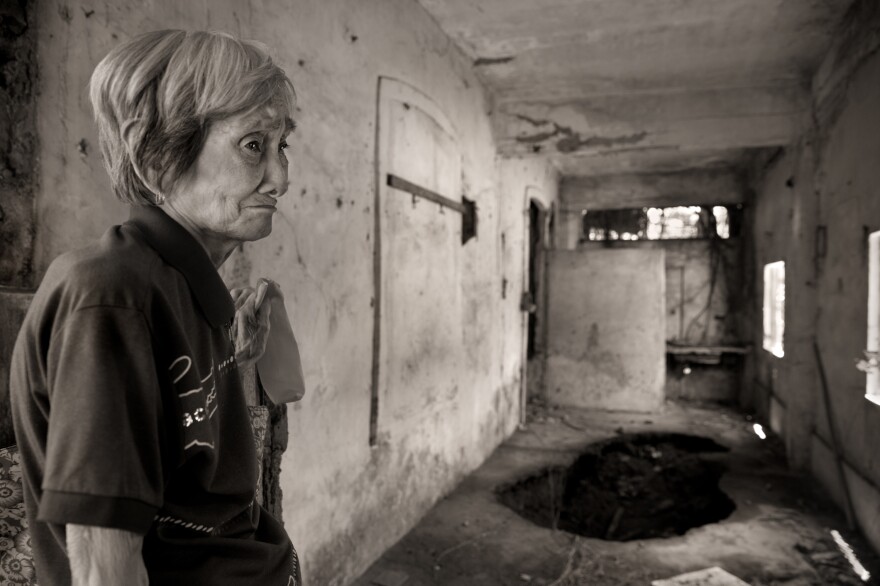
She recalled that she was 12 years old, traveling with her family as they moved back from the mountains where they'd sheltered at the start of the war, when Japanese soldiers stopped them. "They saw me and they said, 'She's beautiful!' "
The soldiers led her to their armored vehicle. She remembers trembling "with fear" as she left her family behind. The soldiers brought her to the mansion in Roxas City, which had been commandeered by the Japanese Imperial Army. Teresita shudders as she tells how they pushed her into a small windowless room "lit by one electric bulb."
Teresita says she cried, "Help me, God," as Japanese soldiers paired off and, two at a time, raped her until she "lost consciousness." Locked in the storage room for one week, Teresita says she was supplied with clean clothes and food but couldn't eat: "I had no appetite."

She fondly remembers a Filipina, who she suspected was the mistress of one Japanese officer. She "took pity on me," says Teresita, who calls her "an angel."
"She told me, 'Don't worry. I will help you.' " That night she spirited Teresita off to a waiting boat up the river. After several days she reunited with her family.
Teresita's parents ordered her to never speak of what happened, she said. Maneuvering around her father's strict attitude toward suitors, Teresita says, at age 20 she answered an ad in the newspaper calling for pen pals. After a five-year courtship nearly all by mail, she married her pen pal in 1956, and together they raised a family.
Teresita told us that throughout her life, she did "agonize" over the sexual assault. Then at age 50, "I decided to think of the present. The present is good."
She stood up in her dining room, raised her arms, swiveled her tiny hips and began to shuffle her feet. "I started dancing, ballroom dancing, any kind of dancing," she says. "It changed my life."
It would be another 20 years before she would publicly reveal her wartime ordeal, a decision that came in 2000, after hearing her daughter's mother-in-law talk on the radio about how she'd been a "comfort woman."
"We were both shocked," Teresita recalls.
Because Teresita did not declare herself a victim in the early stages of compensation efforts for the "comfort women," she was not eligible to receive money. She currently lives with her daughter, Divina Dayo Bermejo, 58, in Roxas City and is unable to move around without assistance. She lives off her late husband's modest pension and a monthly stipend from her days as a schoolteacher — reason enough to receive reparations, she says.
Maria Quistadio Arroyo:
Maria Quistadio Arroyo was suffering from dementia when we visited her in late May 2019 at the home of her granddaughter in Roxas City, in the central section of the Philippine archipelago. From the front porch, she gazed at visitors, wide-eyed and unable to murmur all but a few words: "I don't remember any of you. I'm now old. I don't remember."
![Maria Quistadio Arroyo was 12 when she was sexually enslaved for three months by Japanese soldiers. She eventually married and had seven children but says her husband became abusive in his later years, beating her until his death in 1997. "For years," she testified, "I endured my husband's ridicule while no one pointed fingers at those ... responsible for the [wartime] assaults."](https://npr.brightspotcdn.com/dims4/default/8417e45/2147483647/strip/true/crop/3500x2325+0+0/resize/880x585!/quality/90/?url=https%3A%2F%2Fmedia.npr.org%2Fassets%2Fimg%2F2020%2F12%2F02%2Fsfe_cdmoz_lolas_03_custom-8f25e06bb125fdc7784f4f0b116c7d503d565b34.jpg)
In earlier testimonials, she had recounted that in September 1944, Japanese soldiers barged into their home when her parents were in the fields harvesting and dragged her and her brother off to their encampment at the Capiz Emmanuel Hospital. The soldiers had slaughtered the family's pig and forced her brother to carry the carcass to the garrison, where he dropped it at the entrance. Seeing "no further use for him," Maria said, the soldiers beat him to death in the yard.
She passed out and recalled waking in a locked room, the start of a savage routine where, she said, "sometimes two or three soldiers would alternate raping me," heedless to the pleas of a 12-year-old.
In these interviews, Maria had said she felt "blessed" when David Arroyo, a carpenter, pledged "to reverse what damage" the Japanese had done to her during the war.
But her husband's promise to protect her turned false, and Maria said that as he grew older, he drank and became violent.
Her daughter Lolita Arroyo Acuyong told NPR that on many occasions her father would hit her mother with "his fists" and "wooden planks." She said her mother "didn't want to escalate the confrontations, so she kept quiet."
Maria said she suffered her husband's abuse until he died in 1997.
"For years," she testified, "I endured my husband's ridicule while no one pointed fingers at those who were responsible for the [wartime] assaults." But she heard the survivor association known as the Lolas Kampanyera (Grandmothers Campaigning for Peace and Compensation) arguing that the "comfort women" should not bear the shame. "Lest my story be lost in oblivion," Maria joined the group in 2001.
Maria Quistadio Arroyo died Oct. 15, 2020, at age 88. Like many "comfort women," she lived a life of economic distress. Her family raised money for her burial from the local governor and congressman. Other surviving "comfort women" donated money. The funeral parlor issued a loan for the remaining amount.
[Editor's note: Maria Quistadio Arroyo's recollections were drawn from her testimonials in Justice with Healing: An Anthology on the Lolas Kampanyera, former comfort women from the Roxas City area, published in 2007, and War Crimes on Asian Women: Military Sexual Slavery by Japan During World War II: The Case of the Filipino Comfort Women. Arroyo's daughter Lolita Arroyo Acuyong supplied vital additional details.]
The League Of Grandmothers
Narcisa Claveria became an early member of the Lila Pilipina — the League of Philippine Lolas — the country's earliest organization for surviving "comfort women."
"Lola" is the Tagalog term for "grandmother," which is how the public often refers to these women. "Lila" is an abbreviation that means "League of Lolas."

Founded in 1994, the organization grew to include some 175 women, with the stated goal of enabling the women "to have a direct voice in the direction of their campaign for justice." Some women, including Narcisa, had petitioned a Tokyo court in 1993 for Japan to formally apologize and pay compensation.
The courts ruled that all postwar claims had been settled by the 1951 San Francisco Peace Treaty. As Pulitzer Prize-winning historian Herbert Bix explains in Hirohito and the Making of Modern Japan, "Virtually the only reparations that Japan would ever have to pay — a mere 1.02 billion dollars worth of goods and 'services' spread out over many years — were to the Philippines, Indonesia, Burma, and (later) South Vietnam."
And none of it was intended to compensate for the damage from Japan's sexual slavery system, says Nelia Sancho, former coordinator with the Asian Women's Human Rights Council. Inspired by the stories of the "comfort women" in South Korea, she became one of the earliest organizers of survivors in the Philippines. It was Sancho who enlisted a radio station to encourage Philippine women who had been abused by wartime Japanese troops to come forward — the catalyst for their movement.
Sancho says that after general reparations were paid, the Japanese "lost their memory of any more crimes."
Yet the issue of apologizing and compensating for Japan's wartime sexual exploitation is far from resolved — and remains politically contentious.
A succession of Japanese prime ministers has apologized for the "grave affront" to the "dignity" of the women who were sexually enslaved. Some even wrote apology letters personally addressed to the women.
In 1995, Tokyo created the Asian Women's Fund to pay "atonement" money to the women, soliciting private donations; the last of the payments in the Philippines was made in the early 2000s. For the fund, the issue had been wrapped up.
Kazuhiko Togo, a retired Japanese career diplomat, told NPR that the Asian Women's Fund represented "the long process of soul-searching of the Japanese themselves to try to stand by the side of the victim comfort women." The fund's website cites a former Japanese soldier who donated a portion of his military pension.
Togo added, "By nature, that very suffering will not go away. And this we Japanese have to remember, have to recognize and remember."
But controversy arose. Fewer than 100 women in the Philippines accepted the money, according to Sancho, who helped many of them apply. Those who rejected the payment said that compensation from the private sector made it seem like a charitable contribution rather than official reparations.
For them, the fund allowed Japan to evade its legal and moral responsibilities.
By contrast, the Japanese government says 211 women in the Philippines received funds. Sancho says women who were poor but not former "comfort women" wound up on the rolls.
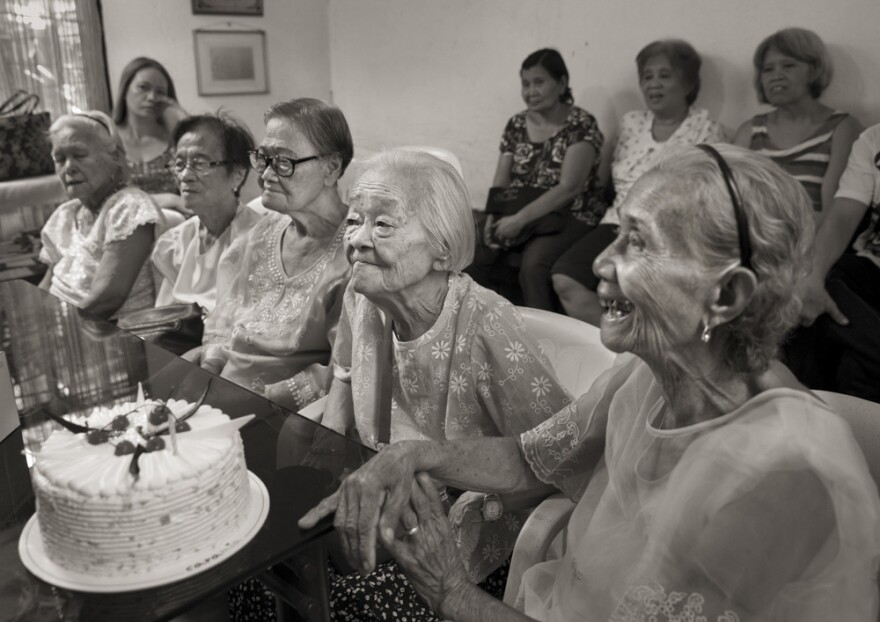
Narcisa accepted the "atonement money," the equivalent then of some $10,000, because she said it had come with earnest wishes from Japanese private citizens. But she returned the letter of apology signed by then-Japanese Prime Minister Ryutaro Hashimoto, saying it could be sincere only if accompanied by compensation directly from the state. She continues to demand state compensation, which she would like to give to her grandchildren.
The Japanese Embassy in Washington declined to provide a spokesperson on the issue. The Japanese Embassy in Manila also declined comment, directing us to a 2013 Ministry of Foreign Affairs statement.
The statement declares: "On various occasions, Japan has clearly expressed feelings of remorse and apology, and its resolve to ensure that such an unfortunate history is never repeated, as shown in the statement by the then Prime Minister on August 15, 1995," a reference to Tomiichi Murayama, who went further than any previous prime minister when he expressed his "deep remorse" and "heartfelt apology" for the suffering that Japan inflicted during the war.
In addition, the Japanese funded some $5 million in medical and welfare projects that improved nursing homes and housing for "comfort women" in the Philippines, South Korea and Taiwan.
However, Gluck, the Columbia University historian, says the position of former Prime Minister Shinzo Abe, who recently stepped down after his second stint leading Japan, "is not one of apology, nor is it one of recognition of the coercion of the comfort women." Abe's right-wing nationalist supporters evince an attitude of "apology fatigue," say critics.
"But of course, when the right wing says that we are tired of apologizing, they actually mean that they don't think we should apologize at all," says Gluck.
Narcisa Claveria blames the government of the Philippines: "Our own presidents don't even know how to protect the citizens who were abused during the war. They were embarrassed by us."
The Philippine government did not respond to NPR's repeated requests for comment. In court documents, the government has said that apologies made by Japan were satisfactory and that Japan had addressed individual claims of the women through payment of "atonement money." Japan is the leading donor of development aid to the Philippines, and Manila is quoted in Philippine Supreme Court documents as saying, "taking up the petitioners' case would be inimical to our country's foreign policy and could disrupt relations with Japan."
Survivors Of A Mass Rape: Ignored As They Seek Justice
Driving toward the village of Mapaniqui, we spot the skeleton of a once-grand red-painted house looming into view, ruins that have occupied the imagination of the women of the area for 75 years. The women are known as the Malaya Lolas — "Grandmothers of Freedom" — and a small group agreed to accompany us to the site during our visit one day in May 2019.
Wearing traditional Filipiniana dress – a blouse and long skirt — three of the surviving "comfort women" stand before the crumbling steps and sing a song they wrote to memorialize the events of the war on this spot:
On how bitter our lives have been
When they released us,
there's nowhere to go.
There's nothing to eat or nothing to wear.
The Malaya Lolas, formed in 1997, are one of the main groups of "comfort women" — except they were not officially classified as sex slaves because they were the victims of a night of "sexual frenzy," as one victim put it, rather than a prolonged system of sexual servitude.

Peering into the ruins of what's known as the "Red House," the group's president, Isabelita Vinuya, 88, tells NPR, "Every time I stand here, it opens fresh wounds."
We interviewed a dozen members of this group, who painted a devastating portrait of events on Nov. 23, 1944, in Mapaniqui village, two hours north of Manila.

That day, these old women were girls, some as young as 8. According to Vinuya, the Japanese bombarded, ransacked and torched Mapaniqui, suspecting it was a Philippine guerrilla hideout. Japanese soldiers rounded up all the men, "tied them to posts" and "machine-gunned" them, says Candelaria Soliman, 90. Maria Lalu Quilantang, 85, says she witnessed her father being castrated and his penis "stuffed ... in his mouth like a cigar." The women recount how in full view of their families, the slaughtered men were piled up and burned in a schoolyard.
Vinuya and her older sister Emilia dela Cruz Mangilit, 91, tell us how the women and girls were then made to haul off goods stolen from village homes to a large elegant house, belonging to a Philippine doctor, that the Japanese had requisitioned.
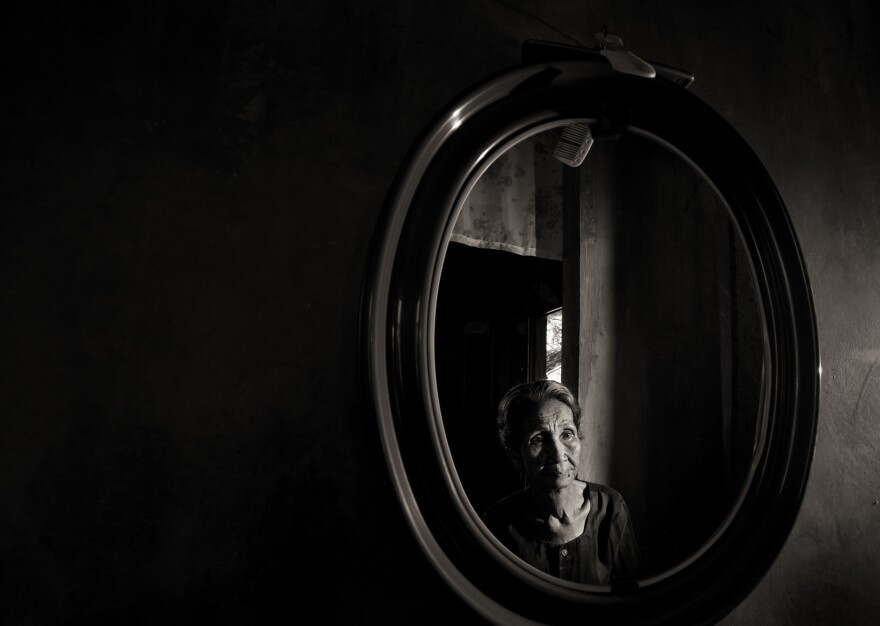
That evening of Nov. 23, 1944, the Red House became the site of a mass sexual assault when some 100 women and girls were "locked inside" and raped through the night by the Japanese imperial soldiers.
"The living room was vast," Mangilit recalls. "The Japanese were just grabbing the girls in the room." She was 15. "I was raped just beside the stairway," she says.
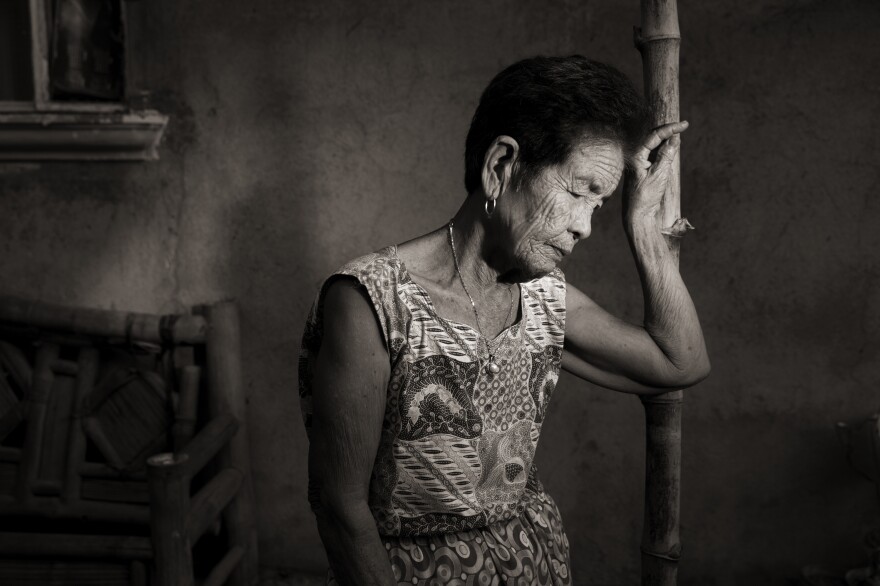
Maria Lalu Quilantang remembers being "pushed so hard" she was "knocked unconscious." She says, "I don't recall what happened to me, but even today, I feel the pain in my body." She was 9 at the time of the mass rape at the Red House. "Whenever I pass by it, my mood always changes." No amount of compensation can "erase" the memories, she says.
In her immaculate home, the petite Mangilit displays a hand-painted wedding picture of her and her late husband, whom she married when she was 22. She had a large family as did her sister, Isabelita Vinuya. Vinuya said, despite what happened to her, her husband "still gave his love to me." But Vinuya recalls one woman who "would instantly shiver" at the sight of a man.

The Malaya Lolas received no compensation from the Asian Women's Fund.
And as a result they have been among the most dogged in the courts.
Their lawyer, Virginia "Virgie" Suarez, told NPR that the Asian Women's Fund and the Philippine Justice Department decided that they did not qualify as "comfort women" because they were not held or abused over an extended period. She says those molested at the Red House may not be "comfort women" per se, "but they are victims of military sexual violence. And for that, they deserve to be legally compensated."
An angry Vinuya says, "Rape is still rape whether it was done for days, for months or for years. The effect is the same. It destroyed our bodies, our sense of self. We lived in shame for years." Mangilit says the Japanese soldiers "violated our womanhood."
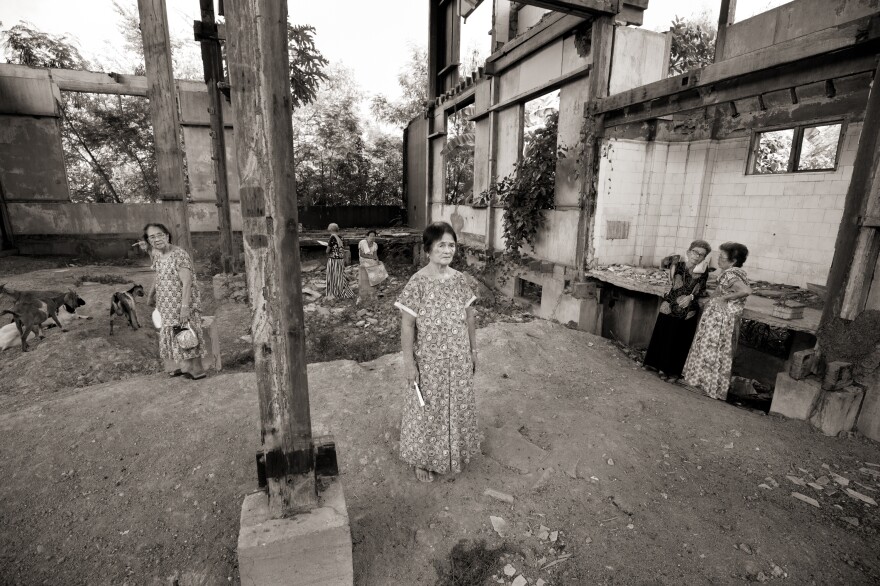
When the Philippine Supreme Court declined their petition to compel the Philippine government to press their case with Japan, the fiercely organized women turned to the United Nations last year in a move that has put Japan's wartime mistreatment of women and girls under the glare of the international spotlight 75 years later. The women invoked the Convention on the Elimination of All Forms of Discrimination against Women, a treaty that establishes a complaint mechanism into violations of women's rights, and they argued that the Philippine state violated its obligations under the convention.
For dismissing their claims as victims of Japan's "female wartime slavery," the women demand that the Philippines pay them "reparations for continuing discrimination." From some 96 original members, fewer than 30 Malaya Lolas survive. Many can no longer walk or leave their homes.
Isabelita Vinuya says, "There are only a few of us who are still alive. Our bodies are weak."
She asks: "When will justice be served? When will we receive help?"
Even The Statues Are Controversial
For Asia's "comfort women" to break 50 years of silence to tell the story of their brutalization was an act "of civil courage," says Gluck, the Columbia University historian.
While justice may have eluded many of the women over the succeeding quarter-century struggle, the women became, in Gluck's words, "international icons of sexual violence against women in war." They have contributed to a body of jurisprudence that aims to end the cycle of impunity for wartime sexual violence.
And study of the women goes on. In recent years, Chinese scholars have asserted that another 200,000 Chinese women were made to service Japan's Imperial Army in Japanese-occupied parts of China. That would put the number of women who were sexually enslaved closer to 400,000.
Today, statues to honor "comfort women" have been erected around the globe from Seoul to Berlin to San Francisco. At least nine have been installed across the United States over the last decade to serve as a reminder to future generations.
But like so many parts of this story, even the statues have sparked controversy.
Togo, the retired Japanese diplomat, says Tokyo is adamant that the statues memorializing the women not be erected in public spaces. Togo says the statues are usually accompanied by a short description that he says conveys a "criminalization of Japan," which Tokyo finds unfair. The reality, he suggests, is "complex." But Togo says it is incumbent upon Japan to more clearly explain "its responsibility, its obligation and what it has done to expunge the guilt."

A bronze rendering of a "comfort woman" was installed in December 2017 on Roxas Boulevard overlooking Manila Bay, the same boulevard on which the Japanese Embassy sits. Its inscription read: "This monument is a memorial to Filipinas who have been victims of abuse during the Japanese occupation (1942-1945)." The statue was removed.
Philippine President Rodrigo Duterte said at the time that the Japanese had not demanded its removal but rather expressed "regret" over the statue. Duterte says he told a Japanese representative that he was in no position to take it down. Duterte is reported to have said, "That is a constitutional right which I cannot stop. It's prohibitive for me to do that."
Yet five months later, the statue was cleared away to make way for what the Public Works and Highways Department called "improvements" to the road.
Sculptor Jonas Roces designed the statue, calling it "physical history." In an interview with NPR at his studio in May 2019, he said the dismantling of his work essentially meant "we lose our dignity as Filipinos."
In August 2019, just months after our visit, Roces reported that his 7-foot bronze depiction of a "comfort woman" blindfolded and draped in a Philippine dress was stolen from his outdoor studio. Roces told NPR in November 2020 that the case remains unsolved.
Togo says that the statues going up across the globe symbolize the enduring interest in the matter of the "comfort women." And the uproar over the statues, he says, reflects a fundamental fact: Even with the passage of 75 years since the end of World War II, "the question of women in the war is not solved at all."
For Narcisa Claveria there can be no forgetting. It's why she still attends rallies on behalf of the "comfort women." She wants her children, grandchildren and great-grandchildren to understand the "dangers of war."
As for herself, she says, "after all the suffering that I have been through, I have to stand my ground until I get the justice that I deserve."
NPR Manila-based producer Ella Mage contributed to this project.
This story was supported by the Pulitzer Center on Crisis Reporting and the Yunghi Kim grant.
Copyright 2023 NPR. To see more, visit https://www.npr.org.




















